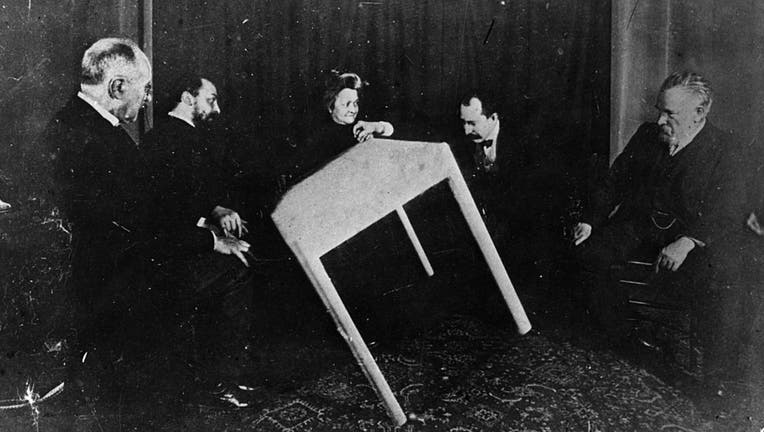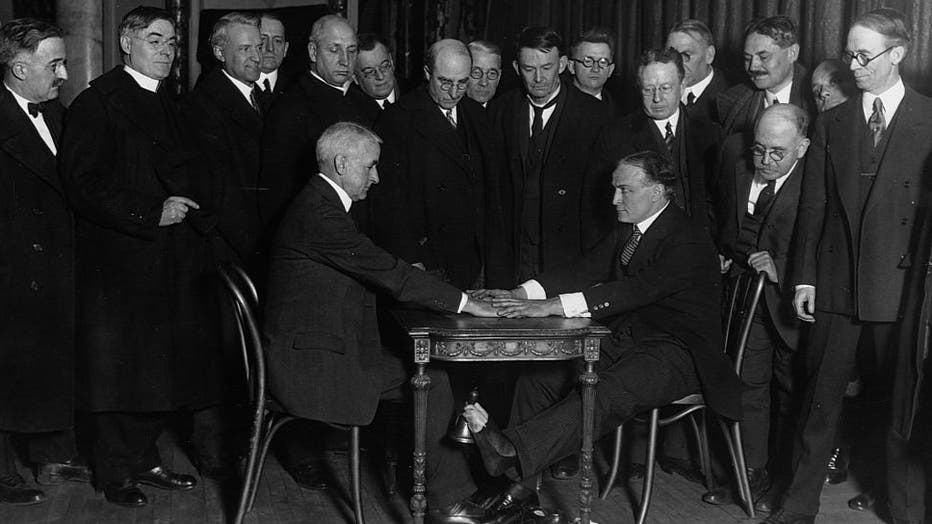Digital seance: New AI tech will mimic speaking to dead family, friends

A table apparently moves of its own accord during a seance in Paris circa 1900. (Photo by General Photographic Agency/Getty Images)
Artificial intelligence can't bring back the dead, but it may be able to simulate speaking to a lost loved one in an effort to help humans through the grieving process.
The high-tech revamp of the traditional seance comes amid the wild growth of large language models, a form of AI that is trained on copious amounts of text. ChatGPT's release year has sparked discussion on how far the tech can go as the chatbot mimics human conversation and answers prompts from humans.
Jarren Rocks, product designer and manager at the Los Angeles-based software development company AE Studio, is working on a program called Seance AI, which will allow people to talk with a chatbot that mimics their dead loved ones.
"It's essentially meant to be a short interaction that can provide a sense of closure. That's really where the main focus is here," Rocks told the outlet Futurism. "It's not meant to be something super long term. In its current state, it's meant to provide a conversation for closure and emotional processing."
Humanity has long been fascinated with trying to communicate with the dead, hitting a fever pitch in the late 19th century when people flocked to attend seances and at least 4 million Americans identified as "spiritualists." Even cultural figures on the world stage, such as Mark Twain and Queen Victoria, dabbled in the occult by attending seances, according to the New Yorker.

Harry Houdini, longtime opponent of fraud among the Spiritualist movement, shows how, during a seance, mediums can ring bells using their toes. (Library of Congress/Corbis/VCG via Getty Images)
Such activities, however, were shunned by many other Americans and Christians, with the Catholic Church issuing a decree in 1898 that condemned spiritualistic practices and another decree in 1917 that prohibited seances.
USING AI TO CHALLENGE DEATH'S FINALITY
With the planned AI seances, only a chatbot will be communicating with the living, but Rocks said he’s leaning into the "magical" aspect of the tech.
"We're trying to make it sound as magical and as mystical as possible," he told Futurism of Seance AI’s name.
Rocks told Fox News Digital that the name of the program is "intentionally striking because we're confident that we'll be able to provide real comfort to some people." He added that he and AE Studio are "greatly concerned about AI safety" and that they want "to draw attention to the potential implications of the technology" – but he said they do not want to halt AI's progress though they support "healthy regulation."
The program employs tech from OpenAI, the AI lab behind ChatGPT, and prompts users to tell the program the name of the person with whom they wish to speak, their age, personality traits and how they died, according to the outlet. Users will also upload text from their deceased loved one as a template on how the deceased person communicated when they were alive.
ANTI-'TERMINATOR': AI NOT A 'CREATURE' WORKING TOWARD SELF-AWARENESS, OPENAI CEO ALTMAN SAYS

The program employs tech from OpenAI, the AI lab behind ChatGPT, and prompts users to tell the program the name of the person with whom they wish to speak, their age, personality traits and how they died. (Josep Lago/AFP via Getty Images)
Once the information is uploaded, the user is taken to a webpage that shows a flame and then can send a message to their simulated loved one. The chatbot responds based on the information it was given, simulating the deceased loved one, Futurism reported.
Rocks told Fox News Digital that he had been considering building such technology since the advent of large language models, noting that he and his co-workers at AE Studio have all experienced loss of a loved one.
"Personally, I'm not as curious about the other side as I am addressing the grief that we deal with on this side," he said. "We as people have been obsessed with understanding what is beyond death for a very long time, and while there are many grief-tech solutions for counseling, or therapy, few address personal loss so boldly."
The program, which strikes a similar tone as a "Black Mirror" episode that details the hyper-realistic synthetic recreation of a dead character, is not intended to be used on a regular basis, according to Rocks.
AI COULD GO 'TERMINATOR,' GAIN UPPER HAND OVER HUMANS IN DARWINIAN RULES OF EVOLUTION, REPORT WARNS
"For short conversations, I think it feels decently human. I think it falls apart a little bit [when you] start to pick up on repetitions," Rocks said. "It's following a pattern, it doesn't really know exactly what's going on."
Rocks compared the program to a high-tech Ouija board that can be used for closure purposes.
"A traditional seance isn't something that lasts forever. Personally, I think the short time span helps encourage closure, a tool to help you process some unresolved emotions. That said, there are some potential long-term applications that could be viable, and we'll likely launch other features later on," he told Fox News Digital, pointing to potentially building a feature such as an "AI ghost of someone at a grave site."
"My key priority for Seance AI is that we provide people with tools to help them process loss," he added.
Artificial intelligence has gained traction among people who are grieving the loss of a loved one, including through recreating a deceased person’s voice.
South Korea-based tech firm DeepBrain AI crafted a program called "Re;memory," which allows users to upload video, audio and photos of deceased people that is then used to create a virtual version of the person that can communicate with humans. In China, tech developers are building what they dubbed as "griefbots" so people can communicate with deceased loved ones, according to Insider.
Rocks said SeanceAI will launch Tuesday, including testing a free tier level of the program as well as a paid tier for longer-term users.

